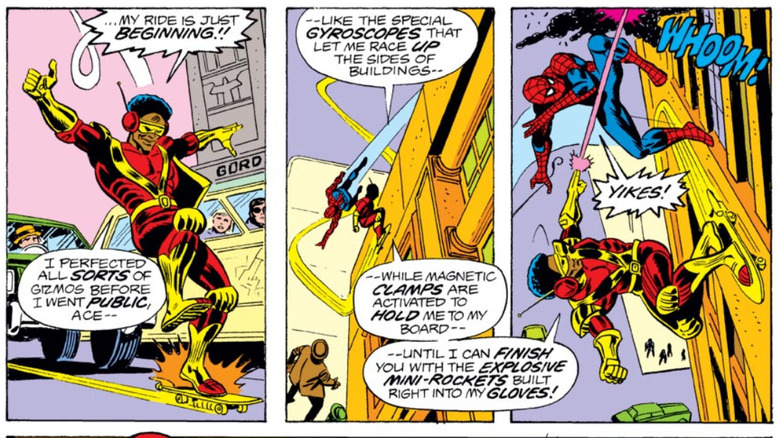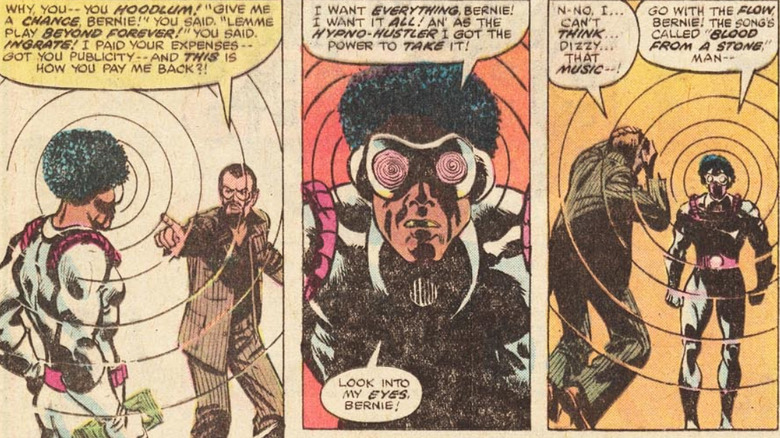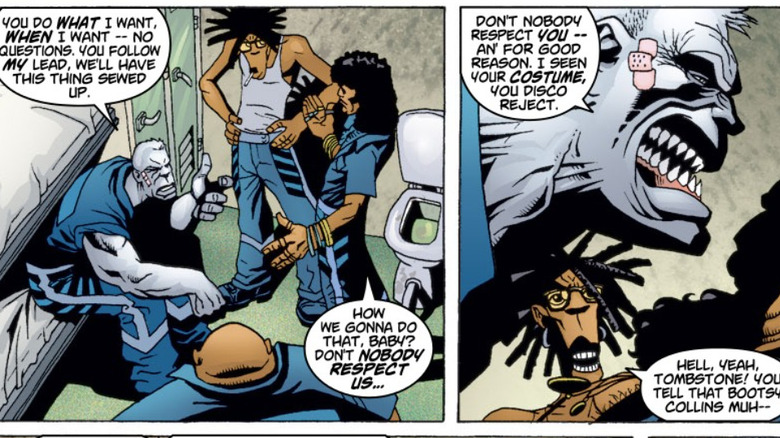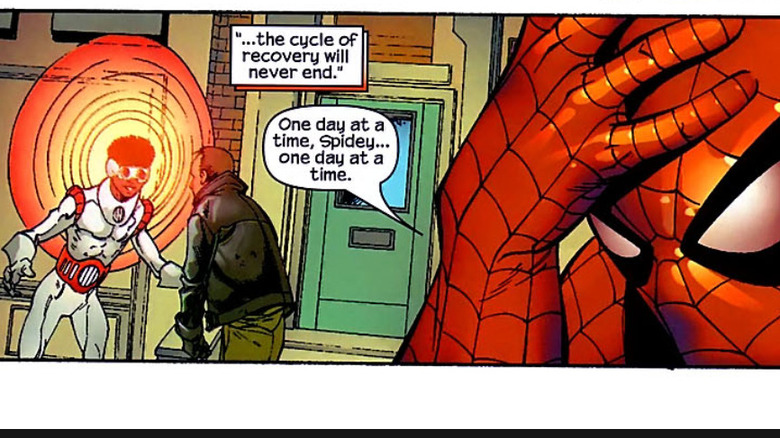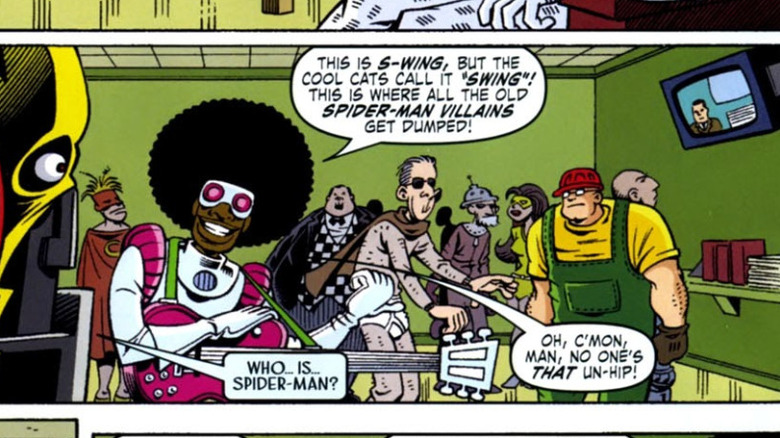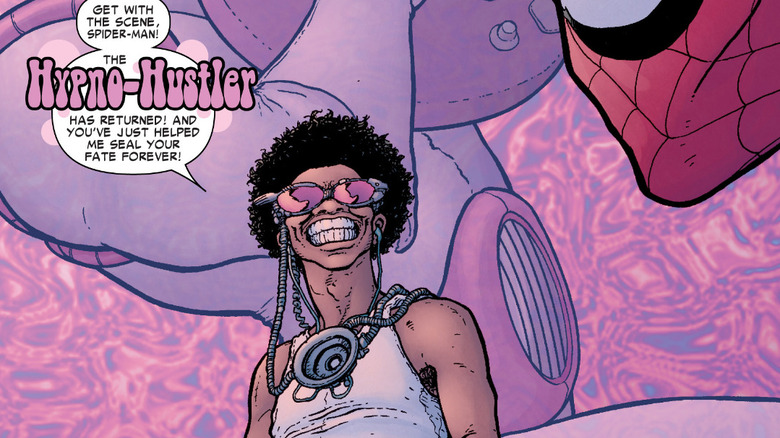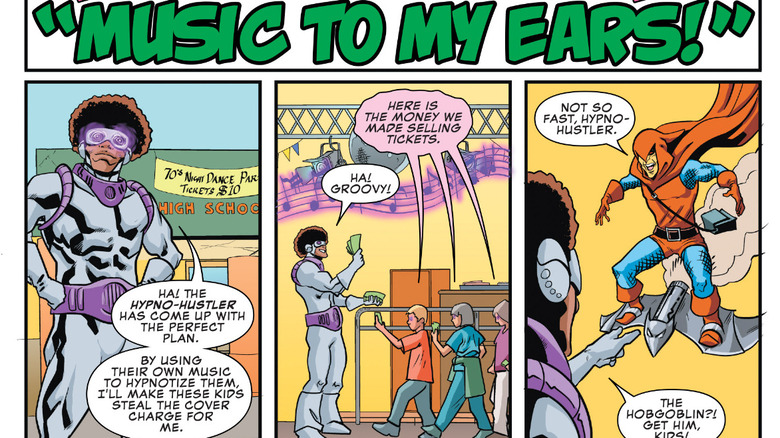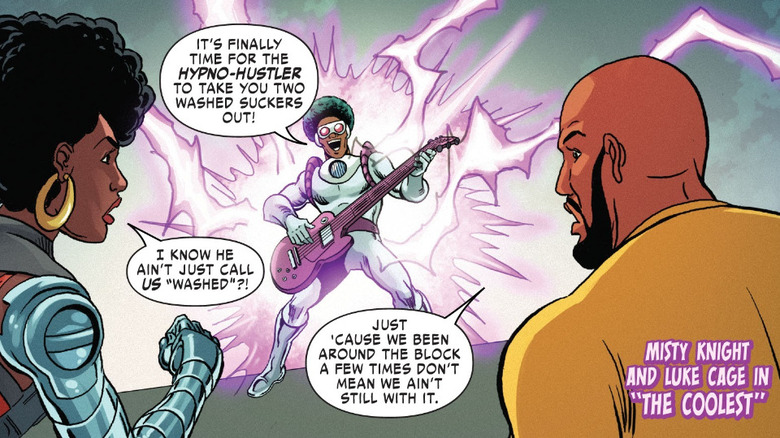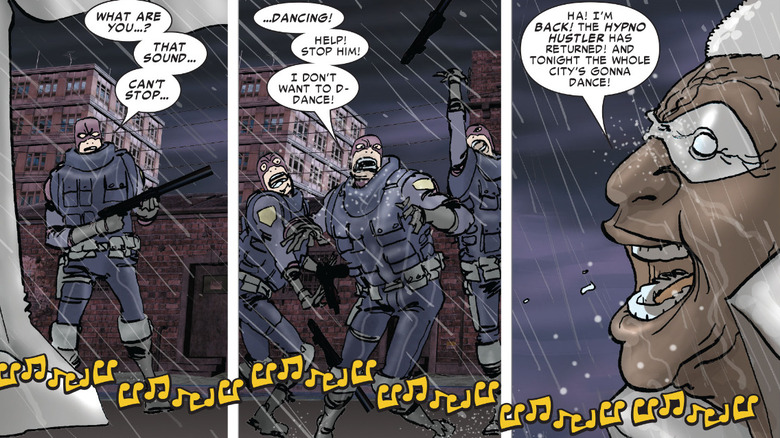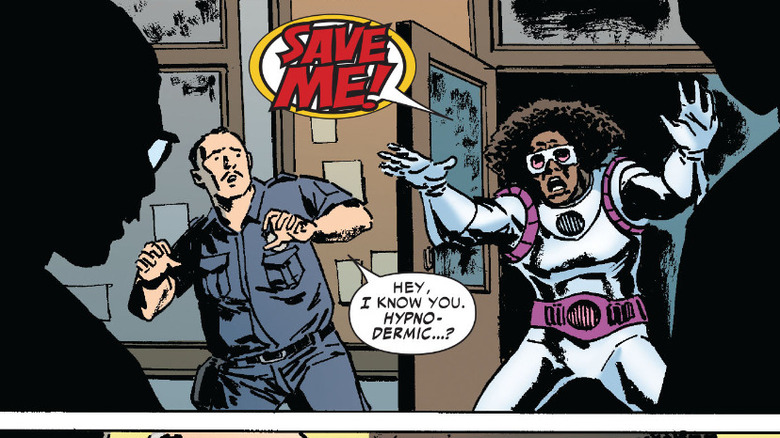Marvel's Hypno-Hustler: Details Only Huge Spidey Fans Know About The Villain
When The Hollywood Reporter announced that Donald Glover was working on a spin-off "Spider-Man" movie about the Hypno-Hustler, many Marvel fans were likely confused. Created in 1978 by Bill Mantlo and Frank Springer, the Hypno-Hustler is one of many gimmicky Marvel characters from the 1970s built to piggyback on popular trends. The frontman of a disco band called the Mercy Killers, he used hypnotizing music to rob people blind, before being stopped by the web-slinging hero. All in all, not one of Marvel's most famous or popular bad guys.
The Hypno-Hustler's revival as a character only began when other writers started portraying him as the hilariously dated anachronism that he truly is, rather than as an unironic villain playing into pop culture. Despite his criminal leanings, the Hypno-Hustler still loves music and has never stopped making references to funk and disco. Over the years, he's become a go-to joke character for comedy stories and perfect fodder for narratives that call for large numbers of B-grade supervillains.
Given all of this, it makes a lot of sense for Glover, an immensely talented musician and comedic performer, to want to try to tackle the character for the big screen. So let's dig a little deeper into the history of the Hypno-Hustler in preparation for what could be a truly unique adaptation.
He wasn't the only silly 1970s Marvel character
During the 1970s, Marvel featured all kinds of comic book characters tied to popular trends of the day. Kung-fu movies started gaining popularity in America, and Marvel introduced Shang-Chi. Blaxploitation movies became a force in Hollywood, and we got Luke Cage, Hero for Hire. Not all of these characters proved popular, however, with many of them being one-offs who tended to only appear again as part of a joke — sort of like our pal the Hypno-Hustler. Many of these characters were introduced in Spider-Man's spin-off title, "Peter Parker, The Spectacular Spider-Man."
For instance, there was Brother Power and Sister Sun — members of the Legion of Light, which was imagined as a cult group similar to those frequently discussed in the media at the time. Then there was Swarm, a Nazi scientist whose consciousness was transferred into a swarm of killer bees. Razorback was the embarrassing "Southern" superhero meant to cash in on the CB radio craze of the 1970s. Wearing a giant hog's head as a sort of cowl, he came to New York in order to learn how to be a proper superhero from a Yankee like Spider-Man. Naturally, he drove a truck called the "Big Pig."
The character closest in spirit to Hypno-Hustler, however, is probably Rocket Racer. The villain built a rocket-powered skateboard to commit crimes, and he later became Hypno-Hustler's partner.
He started with a backup band
The disco themes in the Hypno-Hustler's first appearance are not subtle. He debuts in "Peter Parker, the Spectacular Spider-Man" #24, an issue titled "Saturday Night Spider-Man," the letters of which mimic the logo of the 1977 John Travolta smash hit disco flick "Saturday Night Fever." The plot of the comic involves Peter Parker being shoehorned into going out on the town with his friends to a hot disco called Beyond Forever to see a performance by the Hypno-Hustler and his backup singers, the Mercy Killers.
The Hypno-Hustler's origin isn't especially dramatic or supernatural. A promoter named Bernie helps him get his musical act together, pays his expenses, and gives him a shot to play at his club, and the thanks he gets is the Hypno-Hustler robbing his safe and mesmerizing him. Afterward, he monologues a bit to the Mercy Killers, saying it was "disco magic" that led him to discover that their melodies "perfectly complemented my mind-numbing hypnotic abilities!"
Peter is able to resist the music by putting webs in his ears to drown out the sound. He then changes into his Spider-Man garb to take the villain down. After a mercifully brief fight, Spider-Man deduces that the Hypno-Hustler's headphones protect him from his own gimmick, so yanking them off his head ends the battle. Alas, the Mercy Killers are never seen again.
He was once in Tombstone's gang
What happened to Hypno-Hustler when he got turned over to the police by Spider-Man? The disco fiend was sent to prison. He's later selected by Tombstone, who's in prison awaiting heart surgery after a heart attack, to join his crew. Tombstone is well aware that a loner isn't going to get very far in prison, so he recruits Hypno-Hustler, Rocket Racer, and Big Ben (a former Luke Cage foe) to be his new squad in "Spider-Man's Tangled Web" #16. They aren't given much choice in the matter, as the vicious and super-strong Tombstone isn't one to take "no" for an answer. It's not exactly a highly competent group of soldiers, but beggars can't be choosers.
Tombstone's cellmate is the Spot, who's due for parole. He concocts a convoluted plan that seems to involve his crew and the fact that Hypno-Hustler has access to Vaseline. They use it to trip up the vicious Kangaroo, who's Tombstone's chosen victim in all of this. However, the Spot apparently rats on Tombstone, who gets beaten down by the guards. Tombstone is sent to solitary confinement, and Kangaroo beats up his crew, with poor Hypno-Hustler left hanging over a cafeteria railing. This is all a ruse, however, as the Spot actually helps Tombstone escape and get the surgery. Tombstone's crew is abandoned, and he kills the Spot later when he annoys him. The Hypno-Hustler does everything he's told, but he gets nothing in return.
He tried to turn his life around with Vil-Anon
In "Spider-Man Unlimited" Vol. 3 #12, Spider-Man catches small-time villain Stilt-Man in the middle of some criminal shenanigans and engages him in battle. He's confused when another baddie of similar reputation, the vehicular-minded Big Wheel, arrives and tries to help him defeat Stilt-Man. Big Wheel, real name Jackson Weele, was once a crooked businessman who embezzled money from his company, then hired Rocket Racer to steal the evidence. When Rocket Racer tried to blackmail him, Jackson got his Big Wheel vehicle from the Tinkerer to fight back. In short, he's not exactly the kind of character you'd expect to see helping Spider-Man.
Weele reveals that he's done his time in prison and is not only reformed, but part of a 12-step group called Vil-Anon. He joined while in prison, and at one meeting he recalls, we see other members like Man-Bull, Equinox, the Schizoid Man, and the Armadillo. He says he's helping Spider-Man because of Step 9, which is making amends for past wrongs. Big Wheel tried to kill Spidey, so now he's making amends by fighting crime beside him. Of course, this all goes horribly wrong in the end and Weele winds up feeling useless, but he finds a second life as a monster truck superstar.
While giving a Vil-Anon pitch at a prison, Big Wheel encounters the Hypno-Hustler. The disco villain is inspired by Jackson and decides to do exactly the same thing: Help Spider-Man fight crime. An exasperated Spidey, seeing Hypno-Hustler hypnotize a mugger, can only say, "One day at a time."
He got locked in the S-Wing with other Spider-Man villains
If it seems like Spider-Man has fought a lot of less-than-exciting villains over the year, it's because he has. As a street-level superhero, there's much less of a barrier between Spidey and a random crook who decides to put on a costume than other for other heroes like the Avengers. In prison, there's even a special place for these loser Spider-Man villains known as the S-Wing.
In "Fin Fang Four Return!" #1, The robot Elektro, who was previously hanging around with Fin Fang Foom, reforms and gets a job in the Baxter Building mailroom with Willie Lumpkin. He tries to withdraw money from the bank because he wants to get flowers for Roberta, the Fantastic Four's robotic receptionist. However, the teller thinks that he's actually Electro, the Spider-Man villain. She calls the cops, and Elektro gets thrown in jail. The police even stuff him into a leftover Electro costume and send him to the S-Wing.
There, he encounters a rogues' gallery of rejects. Many of them, including Demolition Derby, June Jitsui, and Legal Eagle, actually appeared as villains in Marvel's Hostess Fruit Pie ads. There's also the Hypno-Hustler, who welcomes his "funky metal brother" to what the "cool cats" call "Swing." Elektro has no idea who Spider-Man is, but he's determined to get back to Roberta and leads the Spidey-foes on a jailbreak. Hypno-Hustler and his friends get hit with sedation foam, while Elektro escapes.
He fools Deadpool into helping him against Spider-Man
In "Avenging Spider-Man" #12, the Wall-Crawler finds himself in a horrible high school dream, where he encounters Deadpool. Deadpool informs him that someone is trying to mind-control Spider-Man, but that he's been sent into his dreams in order to free him. They have to go through four levels of dreaming, fighting foes that look like bullies to Peter but look like something else in real life. Finally, Spidey wakes up, and Deadpool reveals that he was the one who was helping guide him through the mind control. He used Peter to free his client from prison, and who else could it be but the Hypno-Hustler?
In a shockingly smart scheme, the Hypno-Hustler gets the help of his cellmate, the Tinkerer, to improve his goggles. They allow him to directly apply mass hypnosis without needing any outside augmentation (like his former backup singers). He hypnotizes Spidey into thinking that various escaped prisoners are his deadliest foes, but seeing the names of their actual loser identities like the Painter and Boomerang helps Peter beat them. Hypno-Hustler then compels Deadpool to fight Spider-Man, but Spidey finds a trigger phrase ("Ryan Reynolds") to snap him out of it. Switching costumes, they fool Hypno-Hustler into taking off his goggles, and he's easily beaten. An irate Spidey then hypnotizes Deadpool into thinking he's in "The Rocky Horror Picture Show" so he stays in prison. Though he doesn't come out victorious, this is definitely one of Hypno-Hustler's more impressive schemes.
He once battled the Hobgoblin
After the events of "Axis," when a number of characters have their alignments reversed by magic, the villains become good and the heroes become evil. One of the affected villains is the original Hobgoblin, Roderick Kingsley. Kingsley was originally among the greediest and most ruthless of villains. However, he wasn't always interested in one-on-one battles if he could prevent them. In fact, he made a lot of his money getting the rights to and then franchising out old villain names and powers to younger versions, and then getting a cut of their profits.
What happens when Roderick Kingsley becomes good? Well, he's no less greedy, as he franchises out to would-be heroes instead. Some of them are losers, like Razorback. Others are former villains hoping to make money in a new way, like Water Wizard. Kingsley even franchises out a "Hobgoblin Adventures" comic and writes a self-help book. He has an ad for his new "Hob-Stoppers" candy where he defeats the Tinkerer with them, in the style of a Hostess Twinkies ad.
Then there's something that looks similar but says "not an ad," as our old friend the Hypno-Hustler enslaves a bunch of kids using his powers. His goal? To steal the profits from a 1970s-themed dance party. When the Hobgoblin arrives, the villain orders the kids to attack him. However, Hobgoblin destroys the source of the entrancing music, and the kids beat the disco baddie up, chanting, "You can't force us. That's bullying, and bullying isn't cool." Poor Hypno-Hustler!
He crashes an argument between Luke Cage and Misty Knight
In "Marvel's Voices: Legacy" Vol. 2 #1, the Hypno-Hustler surprises two old friends — Luke Cage and Misty Knight – and accuses them of being washed. They're both indignant about this, but it somehow devolves into an argument about which one of them is cooler. Cage makes his pitch, claiming he has "style points for days." Misty makes fun of him, scoffing at the idea that wearing a t-shirt and jeans is "style." Cage retorts, "It's subtle, but it's undeniable," and Misty shoots back, "In 1972, maybe." She argues that her cyborg arm and "sweet gun" are much cooler than Cage's look. Meanwhile, Hypno-Hustler uses a new power, apparently generated by his guitar, to zap Cage with some kind of energy beam.
Ignored by both of them, a pouting Hypno-Hustler says, "You two are being very unfunky right now." Cage and Misty both realize they forgot about their opponent when they started arguing, and they take him down with one punch. They then agree to allow the Avengers to decide which one of them is cooler, but both agree that it has to be the younger members. Maybe Hypno-Hustler shouldn't have antagonized them in the first place.
Hypno-Hustler defies the Reign
In an alternate future depicted in "Spider-Man: Reign" #2, New York City is subject to the Reign – a fascist police state "protecting" its citizens from "super-terrorists" and other frivolities like elected governments and freedom of the press. New York's superheroes have been mostly eliminated or run out of town, and even Spider-Man is now old and lonely, living with the delusion that his wife Mary Jane is still alive. Of all people, it's J. Jonah Jameson who snaps him out of his funk and gets him to fight back against the Reign's plan to install the Webb, a latticework laser shield around the city.
Speaking of funk, Spider-Man isn't the only one who decides to defy the Reign. Our man Antoine, the Hypno-Hustler himself, is inspired by Spider-Man. After selling mixtapes at a small shop for years, he decides that if Spider-Man is really back, he's going to need help — "old-school" help. Putting his "Hypno-Mix '86" tape into his boom box, the Hypno-Hustler lives again! Proclaiming that the "Godfather of funk" is making a comeback, he demands that the Reign thugs shake it. Hilariously, the soldiers start dancing and can't stop, as the Hypno-Hustler declares, "Tonight the whole city's gonna dance!"
Unfortunately for him, the Hypno-Hustler forgets to put in fresh batteries, and his boom box dies. The angry guards shoot him down, but a seed of revolution is planted.
Hypno-Hustler is always in the background
There are some villains who are always main-event players in the Marvel universe. Doctor Doom, Red Skull, Magneto, Ultron, Loki — villains whose mere presence inspires terror and demands an all-hands-on-deck response from the heroes. However, there are very few of these villains. Most comic book bad guys are jobbers just trying to make ends meet in-between robberies, revenge schemes, and other short-sighted get-rich-quick daydreams. These guys are frequently in the background, and they even hang out together in their off hours. Hypno-Hustler is very much one of these guys in the background most of the time.
There have been various incarnations of it, but the Bar with No Name is a well-known super-villain hangout. Hypno-Hustler is there when Sabretooth and Iron Fist bust in looking for the man who's impersonating Sabretooth's old friend, the Constrictor ("Iron Fist" #74). And when rumors spread that Power Man and Iron Fist stole the supersoul stone, Rocket Racer and Hypno-Hustler are there on the scene, even though the disco villain doubts that they did it ("Power Man and Iron Fist" Vol 3 #2).
In arguably his most memorable cameo in "Amazing Spider-Man" #645, Hypno-Hustler bursts into a police station — in full costume — begging for help. Spidey is on a rampage looking for Harry Osborn and Lily Hollister's baby, and he's beating up villains left and right. An officer tells a subordinate to take poor Hypno-Hustler to "clown college." Whenever a silly villain is needed for a comedic cameo, Hypno-Hustler is there.

